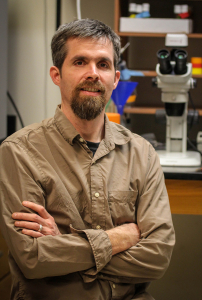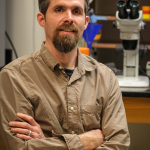Assistant Professor of Biology Patrick Ferree is the recipient of an $830,000 five-year grant from the National Science Foundation (NSF) Career Development Program to research genome conflict. Ferree is in the W.M. Keck Science Department of Pitzer College, Claremont McKenna College and Scripps College.

 The grant, “Paternal genome elimination by a selfish B chromosome in the jewel wasp Nasonia vitripennis,” supports Ferree’s ongoing research into genome “parasites” buried in the DNA of insects in the hymenoptera order, including ants, bees, and wasps. The common conception – that the full genome works together in harmony – is upended by individual “selfish” chromosomes altering and overwriting patterns of inheritance at the molecular level.
The grant, “Paternal genome elimination by a selfish B chromosome in the jewel wasp Nasonia vitripennis,” supports Ferree’s ongoing research into genome “parasites” buried in the DNA of insects in the hymenoptera order, including ants, bees, and wasps. The common conception – that the full genome works together in harmony – is upended by individual “selfish” chromosomes altering and overwriting patterns of inheritance at the molecular level.
Indeed, one known as Paternal Sex Ration (PSR), a non-essential extra chromosome seen in jewel wasps, strips away the paternal genome, ensuring the larval wasp will develop into a male. This act benefits the PSR chromosome because it is only transmitted to new offspring through sperm cells made by males.
“Our experiments reveal how selfish chromosomes can hijack the rest of the genome,” Ferree said of his research in 2012. “It begs the question if this type of effect might occur in humans.”
The funding supports the hiring of a post-doctoral fellow for the life of the grant and the purchase of some much-needed infrastructure, including a climate-controlled incubator and multiple PCR machines for replicating DNA sequences for study. Most important, however, are the lengths the grant goes to strengthen the educational outreach component of Ferree’s research.
“The plan is to move the research into the classroom,” he says. “It will start out in a developmental biology course, but eventually we’ll introduce the work to two-year community colleges, including Pasadena City College. The NSF emphasizes broad impact and outreach; I think that’s one of the things we do well at Keck.”
The Career Development Program is regarded as “the most sought-after recognition a new faculty member can receive” from the NSF given its intended ability to advance someone as an expert in their particular field. Ferree, for his part, feels grateful to have the opportunity to expand his research to the next stage.
“This will be the first in-depth molecular study of B-chromosomes,” he says. “They don’t come from nowhere – so how do they arise from a standard genome? And how do they gain the ability to do what they do?”
Ferree earned his BS in biology from UNC Chapel Hill, his PhD in biology from University of California, Santa Cruz, and was a postdoctoral fellow at Cornell University.
About the CAREER Program
The Faculty Early Career Development (CAREER) Program is a Foundation-wide activity that offers the National Science Foundation’s most prestigious awards in support of junior faculty who exemplify the role of teacher-scholars through outstanding research, excellent education and the integration of education and research within the context of the mission of their organizations. Such activities should build a firm foundation for a lifetime of leadership in integrating education and research.
About the W.M. Keck Science Department
The W.M. Keck Science Department is the interdisciplinary home to all biology, chemistry, and physics faculty for Pitzer, Claremont McKenna and Scripps colleges. The department is administered cooperatively and is housed within an 81,000-square-foot center located at the intersection of the three colleges. The department offers 13 discrete degree options, including dual-degree programs in partnership with schools of engineering and majors in conjunction with disciplines outside the sciences. The W.M. Keck Science Department provides comprehensive, interdisciplinary instruction in small class settings and numerous opportunities for students to conduct research.

